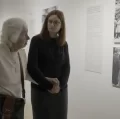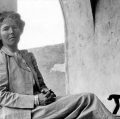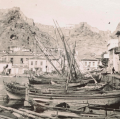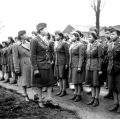Manto Mavrogenous: The Greek Heroine of the Greek Revolution 1821
 Manto Mavrogenous was a dominant figure of the Greek Revolution of 1821. She devoted herself wholly to the ideals and the justnesses of the Freedom of the nation, selflessly offering her love for her country.
Manto Mavrogenous was a dominant figure of the Greek Revolution of 1821. She devoted herself wholly to the ideals and the justnesses of the Freedom of the nation, selflessly offering her love for her country.
Her ancestors were born and lived in Paros. Her great-grandfather, Ioannis Mavrogenis, settled in Marmara of Paros and his son was Nikolaos Mavrogenis, Ruler of Moldovlachia, who built the three marble fountains located on the main street of Parikia. Ioanni’s other son, Demetrios, brought to life Petros Mavrogenis, father of Manto.
Manto was an educated, beautiful cosmopolitan, tall and imposing woman, who spoke French, Italian and Turkish, and was influenced by the values and ideas of the Enlightenment.
She visited Greece at the age of 19 and her immense love for her homeland came from her uncle Reverend Nikolaos Mavros. Thus, she allegedly made the decision to devote herself to the struggle for freedom by offering her entire fortune on the altar of the righteous of the nation.
The website “parianostpos.gr”, reports on Manto’s devotion to the fatherland and the struggle for freedom:
“With ships equipped at her own expense she pursued Algerians who ravaged the Cyclades, equipped two manned ships with which she pursued pirates who attacked Mykonos and other islands of the Cyclades. In October 1822, the Mykonians repulsed the Turks under her leadership. She also equipped and supplied 150 men to campaign in the Peloponnese and sent forces and financial support to Samos when the island was threatened by the Turks. She sent a force of 50 men to the Peloponnese who participated in the capture of Tripolitsa by the Greeks.
“She spent money for the relief of the soldiers and their families but also for the preparation of a campaign in northern Greece, with the support of many Philhellenes. She formed a fleet of six ships and infantry consisting of 16 groupswith fifty men each and took part in operations at Karystos in 1822. She financed the campaign of Chios, but failed to prevent the massacre of Chios. She reinforced Nikitaras with 50 men in the Battle of Dervenakia. When the Ottoman fleet appeared in the Cyclades, she financed the supplies and equipment of the 200 men who fought the enemy and provided shelter to two thousand people who had survived the first siege of Missolonghi. Her men participated in many other battles such as those of Pelion, Fthiotida, Livadia”.
Everything she had, movable and immovable property, money and jewelery she offered to the National Liberation Struggle.
It is estimated that 700,000 piastres, an amount incredible for those times, were spent by her for the Hellenic cause. In 1825, while her resources were depleted, she was forced to divest her family’s properties in the Cyclades islands.
After the murder of Kapodistrias (1831), survival problems were exacerbated, while relations with her family deteriorated. She was accused of squandering the large family property. She was then forced to address a letter to King Otto and explain her situation to him. She never received an answer.
She tasted the ungreatfulness of her homeland as when she applied for a pension as a retired fighter in front of a state official, she was asked: “and what did you do for your homeland?” and the proud Manto to the end, replied: “Nothing…”
The last years of her life, she spent them as a poor, forgotten and impoverished woman. In a state of destitution, she dwelt in Paros where some of her relatives lived. In July 1840, she contracted typhoid fever and died forgotten by all in Paros, the island of her ancestors in 1848. Her body passed through the central alleys of Parikia and ended at the Holy Church of Panagia Ekatontapyliani where the funeral service was performed.


